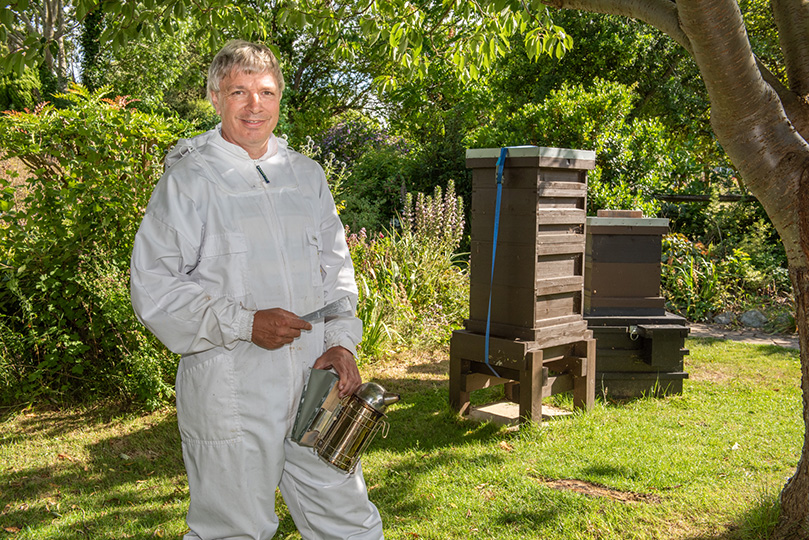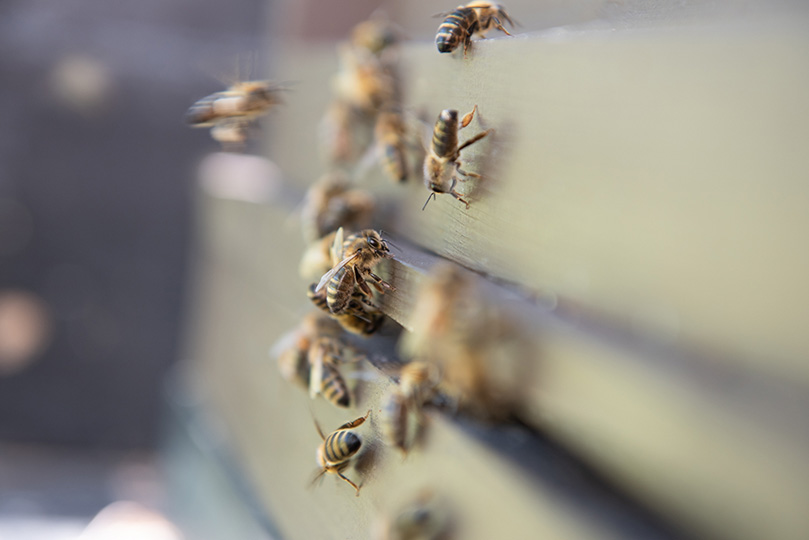
Tony Robinson, local bee keeper. Photographs R Van Twest.
A renaissance in beekeeping has led to thousands of hives in gardens across the county. Local keeper, Tony Robinson, offers advice to the wanna bees.
When Tony Robinson received a beehive as a 50th birthday present from a well-meaning friend, he was less than impressed. He had a keen interest in wildlife and gardening but had never considered beekeeping.
Three years on and Tony has become passionate about the hobby. At his house in Eastbourne he now has 12 hives and keeps up to 600,000 bees during the summer months. He describes bees as “fascinating” and confesses that he had no idea how much there was to know.
He said: “It’s not difficult to start, but you need to educate yourself. Read everything you can. Take a beekeeping course for beginners, Look on YouTube, register with a bee club, and find a mentor. It’s a massive subject, there’s lot to learn!”
Bees are a key stone species

A hive can contain between 10,000 to around 60,000 bees
The renewed interest in bee keeping started a decade ago. Reports of dramatic and unexplained colony losses in the United States led to an outcry from environmentalists around the world. To lose one of the planet’s key stone species would be catastrophic, they said. The resulting media attention led to hives popping up in suburban gardens and yards right across the country. At the same time, the British Beekeeping Association enjoyed a three-fold increase in members.
“The problem for beekeepers is the parasitic mite, varroa destructor,” said Tony. “It sucks the blood of the bee. Responsible beekeepers treat their colonies, because left untreated the disease spreads. You need to know what you’re doing because you can’t use chemicals when there’s honey in the hive, although there are treatments that are considered organic.” He adds: “Beekeeping is really no different to keeping cows, you are responsible for the welfare of an animal.”
Bees are complex, their mission simple
Although bees are complex, Tony describes their mission as “simple”. He explains: “They forage and fill up the hive with food because they need to create stores of honey for the winter months, that means covering up to three miles and visiting thousands of flowers in a day pollinating plants as they go about their business. Bees don’t recognise boundaries or fences and will forage wherever they find nectar, so a small garden isn’t a problem. Point the entrance towards a hedge and they will fly up until they reach their cruising height of 15ft.”
Newbies are often advised that bee keeping won’t take more than 15 minutes a day. Its important to work reasonably quickly and confidently to minimise disruption to the hive, but a good keeper needs to check on space, food stores, and activity in the queen cells as well as colony behaviour. Tony advises: “Don’t tuck the hives out of sight or on an allotment where you can’t observe them, you learn so much simply by watching.”
Although starting with one hive might seem like a good idea, Tony recommends more: “If something happens to the queen, you could lose the entire colony and end up with nothing.”
Hives produce more than honey
In addition to honey, the hives also produce wax, propolis, pollen and bee venom. Although the volume of honey can vary from year to year, this year he anticipates that he will harvest 200 kilos of honey and 25 kilos of wax. He said: “The weather will be a factor in how much we eventually collect because bees don’t like strong winds and rains, it washes away the nectar.”
And despite what is often believed, bees are mostly docile although they can become badly behaved. “You need zero tolerance towards aggressive behaviour but If it happens, you can learn to manage it.” This is most likely to occur in the autumn and can be due to the loss of a queen or a dearth of nectar which results in bees going on the rob to other hives. Rainy weather and high humidity can make them tetchy too. It could be genetic and require the queen to be culled.
But if it’s the thought of a swarm that fills you with dread, Tony has some reassuring words: “A swarm isn’t in defence mood, the bees won’t sting you.”
Bee poo doesn’t sound like a problem …
There are other considerations, such as not inspecting bees when your neighbours are having a BBQ. Bee poo might not sound like much of a problem but you will start to notice tiny yellow or orange splodges when cleaning the car or bringing in the washing. Of course, some people are genuinely allergic to bee stings.
Ultimately, it’s the complexity of bees that has captured Tony’s interest. “They are super organisms,’ he said. “Bees take on specific roles in the hive such as water collecting or undertaking, they have sophisticated navigational skills and they can communicate the location of nectar to the hive through the waggle dance. There’s so much to learn, they are mind blowing, quite brilliant



